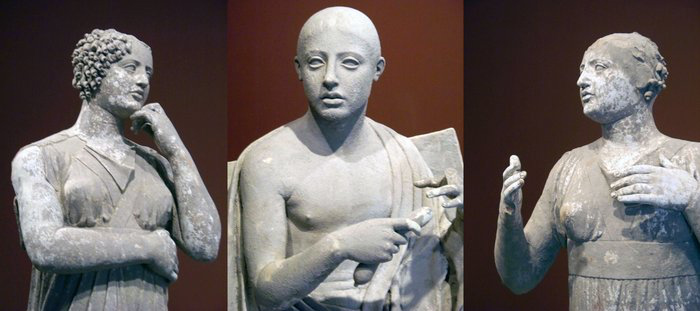
Sculptural Group of a Seated Poet (possibly Orpheus) with Two Sirens, 350–300 B.C., Greek, made in Tarentum, South Italy. Terracotta with traces of polychromy. Sirens: 55 1/8 in. high. The J. Paul Getty Museum, 76.AD.11. Digital image courtesy of the Getty’s Open Content Program
Orpheus, the divining poet of stone, has always made me feel a profound nostalgia for a mythical ancient age of art and poetry. Nostalgia for an age when poets could really sing; an age when youths, bards—destined to decline into rhapsodes and finally into the scribblers we writers have become—used the living word with a divine voice. After this age there was no more psalmonising, no more presentiment, no more divination. No song, no poem, no art of today can truly shine once it has been compared to this first, great season of poetry.
Today the imagination seems dead from an excess of words and an overdose of images emptied of meaning. Words, writing, have lost their religious intensity, their aura. They are a “sign of that which has disappeared.”(1)
It is probably true, as Baudrillard wrote, that “art as such will perhaps have been only a parenthesis in the history of mankind.”(2) Certainly we survive. Others will come “because the earth creates them again as it has always created them.”(3) But we can no longer say we are the same.

Cultures have always held a belief in not looking back—not looking toward the ghost—so as not to run into something terrible. The dead are our ghosts. Shrouded in darkness, they can never come into contact with the living. The myth of Orpheus is an original, solemn, mysterious one. He is not deprived of his beloved by a despotic god; he loses her because he does not keep within bounds. The living cannot hold back the dead. They will escape, always.
Son of Apollo and the muse Calliope, Orpheus received the lyre from his father. With it he accompanied his own song, capable, it is said, of making the trees and the stones move. After Orpheus the lyre was placed by Zeus among the constellations because no one, according to the immortals, was worthy of possessing it. Was this the end of poetry? We cannot say, even if our craft is now only a nostalgic pursuit of that far-off trace left by the gods for the first legendary poets.
Gabriele Tinti’s poem “Orpheus” is read by Robert John Davi. Davi is an American actor, singer, writer, and director who has performed in more than 130 films over the course of his 30-year career.
Notes
1. Jean Baudrillard, La sparizione dell’arte (Milan: Abscondita Editore, 2012), 48. (Available in English as The Disappearance of Art.)
Text of this post © Gabriele Tinti. All rights reserved.




Comments on this post are now closed.